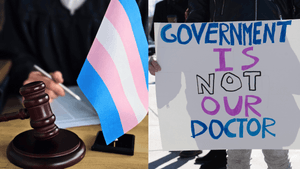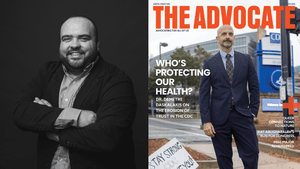Treatment GuideJust DiagnosedSex & DatingAfrican AmericanStigmaAsk the HIV DocPrEP En EspañolNewsVoicesPrint IssueVideoOut 100
CONTACTCAREER OPPORTUNITIESADVERTISE WITH USPRIVACY POLICYPRIVACY PREFERENCESTERMS OF USELEGAL NOTICE
© 2026 Pride Publishing Inc.
All Rights reserved
All Rights reserved
By continuing to use our site, you agree to our Privacy Policy and Terms of Use.
To help you lead your life to the fullest, we at HIV Plus are bringing you this first of our annual 'How To' issues, delving into topics that you've told us you want to know more about but don't see explored in most 'practical' AIDS resource books or websites. This year we tackle the issues of when, where, and how to disclose that you are living with HIV; how to begin healing your emotional wounds by confronting the pain that an HIV diagnosis can often bring on; and how to take your life and turn it into a journey of empowerment to ensure that you'and not some virus'are in control. We hope this first set of life lessons helps you to regain any aspects of yourself over which you feel you've lost control and that you'll continue to share with us other topics you'd like to see explored further. HOW TO DISCLOSE Living with HIV means confronting a laundry list of sometimes daunting decisions. For many, none of these is agonized over more than the rather radioactive topic of whether''and how'to disclose the fact that one is living with the virus. Forty-year-old New York'based fashion designer Jack Mackenroth spent nearly two decades disclosing on a small scale, then went prime-time and told all the viewers of Project Runway he was HIV-positive when he appeared as a contestant on the show in late 2007. 'My therapist used to say, 'You're only as sick as your secrets,' ' Mackenroth says. 'And if you're holding something like that inside, I think subliminally it means that you're shameful about it.' For Mackenroth, disclosing is more than personal'it's political. 'Fighting the stigma is all of our responsibility,' he says. 'Every time that someone speaks out and says that he or she is HIV-positive, it chips away at the stigma for everyone.' Nevertheless, he acknowledges the fact that many people live under a darker cloud of stigma and that such openness can carry potentially grave personal risks'including the potential rejection or harsh judgment by friends, family, and romantic interests as well as the possible loss of housing and employment. Sometimes, though, the rewards of disclosure may come as a great surprise, helping to lessen feelings of shame and the pain of society's stigma. Bob Bowers is an outspoken advocate'and another long-term HIVer'who runs his own youth education nonprofit out of Madison, Wis., called HIVictorious. Contrasting himself with Mackenroth's openness about being gay when he appeared on national TV, the 46-year-old Bowers says with a chuckle, 'I don't brag about it, but I'm a heterosexual.' But his ability to make light of how he handles conversations about living with HIV didn't always come so easily. When he had his first speaking engagement in 1986 he was terrified, he admits, to get up in front of a group of high schoolers in North Hollywood, Calif., and tell his story. But the outcome changed his outlook: 'I received a standing ovation. I was like, 'Wow!' That was unexpected for somebody who'd felt so ashamed and dirty and tainted.' At Home The results of disclosing to friends and family can be like the toss of a coin for HIVers'either gaining them better emotional support or perhaps damaging their closest social ties in life, even potentially severing them altogether. With any luck, though, telling your inner circle about the 'real you' may in fact help you come to terms with your HIV status if you're still wrestling with the news yourself. 'Some people find that a public show of support for their condition from a group of people is incredibly helpful to them,' says Glenn Treisman, MD, Ph.D., an expert on the psychiatric aspects of HIV at Johns Hopkins University hospital. 'I've had many people say to me, 'Yeah, the best thing I ever did was to start talking about this and get help from people who care about me.' On the other hand, there are people for whom losing one friend over HIV is devastating.' Mackenroth says that, for him, the number 1 rule is to get to know the basics about HIV and get ready to clear up any misconceptions for others. After all, stigma is largely a product of ignorance. 'I always tell people who are afraid to disclose to make sure you have your resources and your medical information in place,' he advises. 'It's going to scare anyone who you tell because they're going to be concerned for your health and well-being, but if you can back that up with, 'I'm really proactive, I'm taking care of myself, I've got a great doctor,' then you can buffer their concerns over the news.' In the Bedroom While actual prosecutions are extremely rare, it is a fact that the law in at least 16 states requires HIVers to disclose their serostatus before engaging in consensual sex. In 12 of those states, including Georgia and South Carolina, keeping quiet about being HIV-positive is considered a felony. The law aside, it's a key moral and ethical question whether you are fully obligated to disclose before hopping into bed with someone. Also, even if you do use safer-sex practices but don't disclose, your sexual partner might feel betrayed or hurt afterward and perhaps extremely anxious about whether he or she could have been infected. Bowers says that when he was dating'he's now married to an HIV-negative woman'he always felt it was his responsibility to disclose up front. He actually found that women's reactions provided a helpful sort of litmus test. 'If that person flipped out or was horribly ignorant,' he says, 'that would give me incredible insight into her character.' Psychiatrist Treisman says he believes that Bowers's openness is the way to go. 'It is most people's view that you have an obligation to disclose to that person because their well-being is threatened by exposure to the virus,' he says. 'There is a minority view'but a fairly vocal minority view'that when you have sex with somebody, it's a 'buyer beware' situation. And while that's a laudable and perhaps politically egalitarian view, I think if you give [people] a fatal infection and they die from it because they didn't know about it, that is ultimately something that is going to harm you psychologically.' Tom Donohue, who runs Who's Positive, a nonprofit organization based in Charlottesville, Va., that's also focused on educating youths about HIV, belongs to that vocal minority. 'There needs to be some sort of responsibility on behalf of somebody who's negative to protect themselves,' the 30-year-old says, 'and to be responsible for their own well-being.' At Work Bebe Anderson, the director of the HIV Project at Lambda Legal, helps defend HIVers who feel they've been discriminated against in the workplace because of their serostatus. And she advises caution for people who are considering revealing that information on the job. 'Even though there are laws on the books'and they're supposed to protect you'they don't protect against every type of thing that could happen,' Anderson says. 'It can also be very hard to establish that what's happening fits into what the law says is prohibited.' According to the Americans With Disabilities Act, private companies with more than 15 employees may not discriminate against'and also must provide reasonable accommodations for'people with disabilities. This includes people infected with HIV. Small employers are exempt from the federal law, although some state statutes do provide a wider legal safety net. Anderson says that once you disclose to a coworker, he or she has no legal obligation to keep the news a secret. 'You have to judge for yourself. Would you feel comfortable if everybody in the office knew?' she says. 'Do you know that this is the sort of place where you would be treated fairly, or maybe you don't have a good sense of whether you would?' She recommends testing the waters by checking out the company antidiscrimination policy and also seeing what kind of opportunities are available for helping to educate your workplace about the disease. If indeed you do discover that you need accommodations in your job to help you cope with HIV'for example, a later start time because you have morning side effects from your meds'Anderson says you don't need to disclose that you have HIV. All you need is a doctor's note saying you have a condition protected by the ADA and a description of how you'd like your employer to work around the problem. HOW TO FORGIVE Mark Vosvick, a professor of psychology at the University of North Texas, is in the midst of running a pilot study that's looking into whether helping HIVers develop better forgiveness skills can boost their overall well-being. He's created a psychological intervention based on the work of psychologist Fred Luskin, director of Stanford University's Forgiveness Project and the author of Forgive for Good, whose own forgiveness program is outlined in his book and on his website. Luskin's research has shown that letting go of grudges can not only improve your mood but also relieve physical symptoms of stress, such as backache or indigestion. Vosvick says he designed the study with the hope of finding an antidote to the damaging effects of HIV stigma. 'We know that stigma in general causes stress to people,' he says. 'And when anybody has stress in their lives, it has an impact on multiple systems in their body. One of those systems is the immune system.' Surveying available research on the topic, he found that for every negative effect stigma had on HIVers'depression, anxiety, low medication adherence'forgiveness seemed to promise the opposite effect. Vosvick says his research found that the more forgiving HIVers are, the healthier their behavior was in four key areas: They tended to be less stressed, less anxious, more adherent to meds, and engaged less often in risky sexual behavior. Vosvick has broken his forgiveness plan down into three major categories. Forgiving the other person. Luskin says a big part of letting go of the pain someone may have caused you is to 'rewrite the script' that you have in your head about the source of the hurt. He points out that hating people and cursing their name does not punish them; it harms you. The main goal is to end a sense of victimization and to try to avoid black-and-white thinking that simply points the finger. So instead of always saying, 'My mother ruined my life,' he recommends changing to something like, 'I had a difficult mother, and it's taken me 10 years to figure out what to do about it.' Forgiving yourself. 'You don't always behave the way you think you should,' Luskin says. 'But everybody is fallible and nothing is completely the way we want it to be. That's one of life's lessons.' Forgiving the situation. 'Sometimes nothing is anybody's fault, and bad luck is the only culprit,' he says. 'People looking to blame someone for their HIV infection may find themselves angry at intangible things'like homosexuality; their lack of education about the risks of unprotected sex; or just bad luck, like a needle stick.' Both Vosvick and Luskin also use stress-management and relaxation techniques to help HIVers cope with stigma. Luskin recommends the simplest things: just getting out and jogging for a while, for example, or focusing on the positive aspects of life, like noticing that it's a pretty day. Danny Gray, a 41-year-old yoga instructor who lives in Los Angeles, says he tends to cling to resentment and has to dig particularly deep to let go of past wrongs. His own solution? Although it might initially sound counter'intuitive to some, he offers some grounding advice. He prays for the other person's well-being. After doing so for an old boyfriend he felt had betrayed him, Gray says, 'What has happened is all the good things have come up and are now more prominent in my memory. That's so much healthier for me. And I'm sure that's good for my T cells!' HOW TO MAKE A DIFFERENCE As a major platform in his run for president, Barack Obama called for a renewed dedication to public service from all Americans. Nicole Guide, a 44-year-old New Yorker, already knows plenty about the benefits of volunteerism. She started giving back to her community after getting sober in the mid 1990s, and by 2000 she had set up her own nonprofit organization, Hope's Alive, which has helped disseminate unused anti-HIV meds to people who don't have access to their own. She's also a dedicated public speaker about the virus and drug abuse, and she somehow manages to balance all these efforts while pursuing a degree in public administration and caring for her family. Describing the trajectory of her life, she says, 'Excuse my terminology, but I came from crackhead to master's. I feel like my higher power has given me a second chance, and I could never repay him for the new life he has given me. The most I could do is give my life in service.' Guide says her volunteering 'takes away the self-centeredness and helps me to focus on others. It creates a joy in me.' Robert Remien, a psychiatrist at Columbia University who studies the psychology of HIV, says that getting out and contributing to the greater good of society often leads to a sense of great personal reward. 'It raises feelings of self-esteem, self-worth,' he explains. 'It can boost people's confidence. It can help people who are feeling a little bit depressed. It's a way of widening your social network and potentially your social support network.' There are many ways to get involved in HIV causes'from volunteering to stuff envelopes for an AIDS service organization, for example, to taking on political activism. Perhaps the easiest way to check out opportunities is to visit a local ASO or explore websites that connect people to all kinds of volunteer projects. Jim Williams, a volunteer coordinator at AIDS Project Los Angeles, says of the motivation driving the new volunteers he sees, 'The biggest reason that you hear over and over again is that they want to give something back.' APLA's volunteers log some 65,000 hours a year, saving the organization $1.2 million. Many work in the office doing data entry or transcription, and some commit to work as case management interns. Then there is the food bank and special events, like the organization's Oscar party, AIDS Walk, and marathon. Williams says office-related volunteer work can serve as a useful r'sum' builder, a place to pick up new skills, and a way to test the professional waters for people wanting to return to work after being out with a disability. 'A simple data entry project can help someone with typing speed,' he points out. 'Some people come in because they are trying to just gauge their stamina, to see what their day would look like.' Another way to contribute is to play your part in HIV research and sign up for a clinical trial. Check with your primary care doctor or the clinical department at your local ASO to get help finding one suited to your needs.
From our Sponsors
Most Popular
“So much life to live”: Eric Nieves on thriving with HIV
September 03 2025 11:37 AM
The Talk: Beyond the exam room
August 13 2025 3:15 PM
Messenger RNA could be the key to an HIV vaccine — but government cuts pose a threat
August 20 2025 8:02 AM
It’s National PrEP Day! Learn the latest about HIV prevention
October 10 2025 9:00 AM
Amazing People of 2025: Javier Muñoz
October 17 2025 7:35 PM
The lab coat just got queer
August 21 2025 10:00 AM
The Talk: Owning your voice
August 25 2025 8:16 PM
The Talk: Navigating your treatment
August 01 2025 6:02 PM
“I am the steward of my ship”: John Gibson rewrites his HIV narrative
September 16 2025 2:56 PM
Plus: Featured Video
Latest Stories
HIV-positive men stage 'Kiss-In' protest at U.S.-Mexico border
December 01 2025 12:56 PM
What the AIDS crisis stole from Black gay men
December 01 2025 6:00 AM
The Talk: Starting the conversation
July 25 2025 4:47 PM
Thanks to U=U, HIV-positive people can live long, happy, healthy lives
July 25 2025 2:37 PM
How the Black AIDS Institute continues to fill in the gaps
July 25 2025 1:06 PM
“I felt like a butterfly”: Niko Flowers on reclaiming life with HIV
July 23 2025 12:22 PM
Dancer. Healer. Survivor. DéShaun Armbrister is all of the above
July 02 2025 8:23 PM
BREAKING: Supreme Court rules to save free access to preventive care, including PrEP
June 27 2025 10:32 AM
1985: the year the AIDS crisis finally broke through the silence
June 26 2025 11:24 AM
VIDEO: A man living with HIV discusses his journey to fatherhood
June 10 2025 4:58 PM
Trump admin guts $258 million in funding for HIV vaccine research
June 03 2025 3:47 PM
Grindr is reminding us why jockstraps are so sexy and iconic
May 02 2025 5:36 PM
HRC holds 'die-in' to protest Trump health care cuts
April 28 2025 2:11 PM
Two right-wing Supreme Court justices signal they may uphold access to PrEP and more
April 21 2025 4:10 PM
500,000 Children at Risk: PEPFAR Funding Crisis
April 08 2025 3:51 PM
Broadway's best raise over $1 million for LGBTQ+ and HIV causes
April 03 2025 7:15 PM







































































